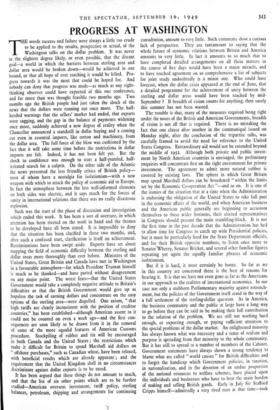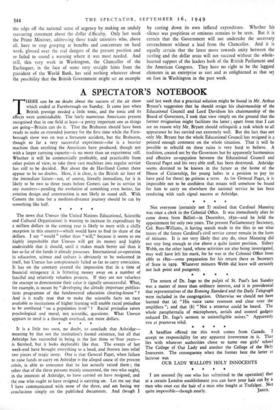PROGRESS AT WASHINGTON
THE words success and failure were always a little too crude to be applied to the results, prospective or actual, of the Washington talks on the dollar problem. It was never in the slightest degree likely, or even possible, that the distant goal—a world in which the barriers between sterling area and dollar area would be broken down—would be achieved in one bound, or that all hope of ever reaching it would be killed. Pro- gress towards it was the most that could be hoped for. And nobody can deny that progress was made—as much as any right- thinking observer could have expected of this one conference, and far more than was thought feasible two months ago. Two months ago the British people had just taken the shock of the news that the dollars were running out once more. The half- heeded warnings that the sellers' market had ended, that exports were sagging, and the gap in the balance of payments widening once more, suddenly achieved a new degree of reality when the Chancellor announced a standstill in dollar buying and a coming cut even in essential imports, like cotton and machinery, from the dollar area. The full force of the blow was cushioned by the fact that it will take some time before the restrictions in dollar imports are felt. Indeed, it has not been felt yet. But the shock to confidence was enough to start a half-puzzled, half- irritated search for a culprit. On the other side of the Atlantic the news presented the less friendly critics of British policy— most of whom have a nostalgia for isolationism—with a new weapon with which to attack the policy of economic aid to Europe. In fact the atmosphere between the less well-informed elements on both sides was electric, and it says much for the forces of sanity in international relations that there was no really disastrous explosion.
Such was the start of the phase of discussion and investigation which ended this week. It has been a sort of overture, in which attention has been riveted on the work in hand and the themes to be developed have all been stated. It is impossible to deny that the situation has been clarified in these two months, and, after such a confused start, clarification is itself an achievement. Recriminations have been swept aside. Experts have set about mapping the field of economic difficulty between the sterling and dollar areas more thoroughly than ever before. Ministers of the United States, Great Britain and Canada have met in Washington in a favourable atmosphere—for which President Truman himself is much to be thanked—and have parted without disagreement on any major point. The worst fears—that the United States Government would take a completely negative attitude to Britain's difficulties or that the British Government would give up as hopeless the task of earning dollars and concentrate on the easy options of the sterling area—were dispelled. One axiom, " that high tariffs are clearly inconsistent with the position of creditor countries," has been established—although American assent to it could not be counted on even a week ago—and the first con- sequences are soon likely to be drawn from it in the removal of some of the more squalid features of American Customs procedure. Stockpiling of rubber and tin will be encouraged at both Canada and the United States ; the restrictions which make it difficult for Britain to spend Marshall aid dollars on " offshore purchases," such as Canadian wheat, have been relaxed, with beneficial results which are already apparent ; and the requirement that the United Kingdom shall in no circumstances discriminate against dollar exports is to be eased.
It has been argued that these things do not amount to much, andthat the list of six other points which are to be further studied—American overseas investment, tariff policy, sterling balances, petroleum, shipping and arrangements for continuing consultation, amount to very little. Such comments show a curious lack of perspective. They are tantamount to saying that the whole future of economic relations between Britain and America amounts to very little. In fact it amounts to so much that to have completed detailed arrangements on all these matters in the course of five days would have been a major miracle, and to have reached agreement on so comprehensive a list of subjects for joint study undoubtedly is a minor one. Who could have forecast, when the dollar crisis appeared at the end of June, that a detailed programme for the achievement of unity between the sterling and dollar areas would have been reached by mid- September ? If breadth of vision counts for anything, then surely this summer has not been wasted.
The trouble is that, many of the measures required being right under the noses of the British and American Governments, breadth of vision is not all that is required. There is no mistaking the fact that one clause after another in the communiqué issued on Monday night, after the conclusion of the tripartite talks, was carefully framed to avoid the need for reference to the United States Congress. Extraordinary aid would not be extended beyond the middle of 1952. Although both private and public invest- ment by North American countries is envisaged, the preliminary enquiries will concentrate first on the right environment for private investment. The agreement to admit more natural rubber is covered by existing laws. The sphere in which Great Britain may spend Marshall dollars can be broadened " within the limits set by the Economic Co-operation Act "—and so on. It is one of the ironies of the situation that at a time when the Administration is endorsing the obligation of the United States to take full part in the economic affairs of the world, and when American business and the American public generally arc beginning to accustom themselves to these wider horizons, their elected representatives in Congress should present-the main stumbling-block. It is not the first time in the past decade that the Administration has had to allow time for Congress to catch up with Presidential policies, but it must be particularly hard for the State Department officials, and for their British opposite numbers, to listen once more to Senator-Wherry, Senator Bricker, and several other familiar figures repeating yet again the equally familiar phrases of economic isolationism.
But if it is hard, it must certainly be borne. So far as we in this country are concerned there is the best of reasons for bearing it. It is that we have not even gone as far as the Americans in our approach to the realities of international economics. In our case not only a stubborn Parliamentary majority against retrench- ment, but the policies of the Government itself stand in the way of a full settlement of the sterling-dollar question. As in America, the business community and the public at large have a long way to go before they can be said to be making their full contribution to the solution of the problem. We are still not working hard enough, or exporting enough, or paying sufficient attention to the special problems of the dollar market. An enlightened minority has always known what was necessary and a sense of realism and purpose is spreading from that minority to the whole community. But it has still to spread to a number of members of the Cabinet. Government statements have always shown a strong tendency to blame what are called " world causes " for British difficulties and to forget the handicap which Government policies, in taxation, in nationalisation, and in the devotion of an undue proportion of the national resources to welfare schemes, have placed upon the individuals and businesses who have to bear the main burden of making and selling British goods. • Early in July Sir Stafford Cripps himself—admittedly a very tired man at that time—took the edge off the national sense of urgency by making an unduly reassuring statement about the dollar difficulty. Only last week the Prime Minister, addressing those trade unionists who, above all, have to stop grasping at benefits and concentrate on hard work, glossed over the real dangers of the present position and so failed to sound a warning where it was most needed. And still, this very week in Washington, the Chancellor of the Exchequer, in the face of some very straight hints from the president of the World Bank, has said nothing whatever about the possibility that the British Government might set an example by cutting down its own inflated expenditure. Whether his silence was propitious or ominous remains to be seen. But it is certain that the Government will not undertake the necessary retrenchment without a lead from the Chancellor. And it is equally certain that the latest move towards unity between the sterling and the dollar areas will not succeed without the whole- hearted support of the leaders both of the British Parliament and the American Congress. They have no right to be the laggard elements in an enterprise as vast and as enlightened as that set on foot in Washington in the past week.



































 Previous page
Previous page